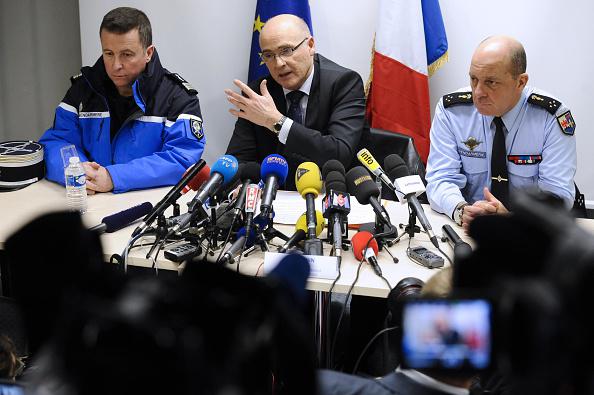Why do authorities think that co-pilot Andreas Lubitz intentionally crashed Germanwings Flight 4U 9525?
French prosecutor Brice Robin—who is investigating the crash as a possible criminal event—says that evidence indicates Lubitz, while alone in the cockpit, initiated the plane’s descent and refused to open the cockpit door to allow the pilot to re-enter.* The CEO of Lufthansa, which owns Germanwings, held a press conference in which he said the plane seems to have been intentionally crashed. He also suggested that “suicide” might not be the right description of what happened: “I would say if one person kills himself and 149 people, I wouldn’t call it a suicide.”
Is it possible that Lubitz simply passed out because of some sort of medical emergency and that the door locked accidentally?
Prosecutor Robin says that the procedure required to cause the plane’s descent would be almost impossible to enact accidentally and that breathing could be heard on the cockpit voice recorder until the moment of the crash. He also says the pilot could be heard asking to be let back in and passengers could be heard shouting. At the very least, there does not seem to have been any plane-wide hypoxia event of the type known or thought to have caused other crashes.
Why couldn’t the pilot unlock the door?
Per available details about the security features of the Airbus A320 involved in the crash, the door has three settings: unlocked, normal, and locked. For the door to be opened simply by turning the handle, a switch inside the cockpit must be pressed to the “unlock” setting. In the “normal” setting, the door can be opened from the outside only by inputting an emergency code into a keypad. But if the switch is set to the “locked” setting, the keypad is completely disabled and the door is completely locked for five minutes. The pilot can apparently be heard on Flight 4U 9525’s voice recorder “pounding” on the door, but it’s not known whether he tried to input the emergency code. Lufthansa CEO Carsten Spohr says it is very unlikely that the pilot would have forgotten the code. If the pilot never tried to enter that code, the events described by Robin could have occurred with the door set to “normal.”
Why did the pilot leave the cockpit in the first place?
Unknown, but it wouldn’t have been unusual for him to get up to use the bathroom.
Can you breathe while you’re unconscious?
Yes.
Have other planes been intentionally crashed by their pilots?
Yes, or so investigators have concluded in several cases involving large aircraft and a number of other cases involving smaller craft.
Why would Andreas Lubitz want to kill himself and the passengers of the plane?
It’s not clear. German authorities say he hadn’t ever come under the suspicion of police or intelligence agencies. Initial accounts from those who knew him say that becoming a pilot had been a longtime life goal and that he seemed to be a happy, satisfied person. A Facebook page that appeared to belong to him has been taken down, but did not apparently indicate any signs of depression or radical beliefs.
What else don’t we know?
In addition to confusion about Lubitz’s motives and what the flight’s pilot did to try to re-enter the cockpit, we don’t know what was on the flight’s data recorder—investigators reported locating the recorder’s casing but not the memory card inside. They also apparently have not recovered Lubitz’s remains, which would presumably be checked for evidence of an incapacitating medical event. And we don’t know exactly why Robin, the prosecutor, is certain that Lubitz initiated the plane’s descent.
Read more of Slate’s coverage of the Germanwings crash.
*Correction, March 26, 2015: This post originally misstated that Brice Robin claimed Andreas Lubitz deliberately locked the plane’s door. Robin in fact said that he believes Lubitz deliberately refused to open the door, which if kept at its setting of “normal” would have required Lubitz to take action to let the pilot into the cockpit. It’s possible that Lubitz set the door to “locked,” which would have prevented the pilot from entering even via emergency code, but we don’t know if that happened.
